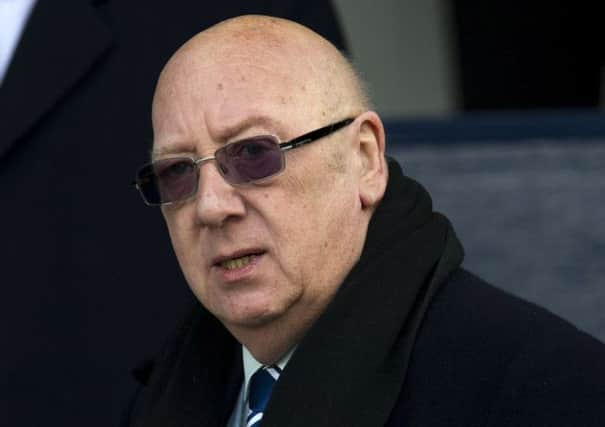Obituaries: Turnbull Hutton, Raith Rovers chairman


Turnbull Hutton, whisky executive and football club chairman.
Born: 19 June, 1946, in Burntisland, Fife.
Died: 5 April, 2015, in Edinburgh, aged 68.
TURNBULL Hutton, who has died in Edinburgh after a short illness, was happy to work away in the drinks industry and be a director and chairman of Raith Rovers. He worked diligently for his employers and his football club, never seeking the limelight until what he himself described as “a rant on the top step outside Hampden” thrust him into the limelight.
Advertisement
Hide AdAdvertisement
Hide AdSuddenly, in 2012, from: “Turnbull who?” he became the conscience of Scottish football, the man who stood up for the wee clubs in the face of what the body public of Scottish football saw as the determination of the Hampden “blazers” to make life less fraught for the liquidated Rangers FC.
If the football establishment thought the smaller clubs would simply roll over and let them ignore their own rules, they had reckoned without Hutton. “Football integrity” became the buzzword as the big, bluff, straight-talking Fifer become the standard-bearer for the opposition.
The “wee” clubs won the day, Rangers had to re-enter Scottish football at the basement of the professional game and Scottish football had a much-needed re-organisation.
However, Hutton, one senses, was not happy with his new-found fame. He may have been the Raith chairman, but, at heart, he was still the ordinary fan who had first watched his beloved club from the terraces.
Born and raised in Burntisland, he went from the local primary school to Kirkcaldy High School, but left before sixth year to join the National Commerical Bank (now part of RBS), working as a clerk in the local Burntisland branch.
After a couple of years he decided banking was not for him and he got a job as a stock clerk with United Distillers in Edinburgh. He was always grateful, as he ascended the rungs of the whisky ladder, for the grounding he got in Edinburgh – six-month spells in every department, so, when he eventually reached executive status, he could speak to everyone and he knew the trade from the ground up.
In 1968, he married Margo, whom he had first met as a fellow pupil at Burntisland. By now, his whisky career was taking off and when the company consolidated much of its downstream operations to their site at Leven, Hutton was invited to run the bond department there.
He was next promoted to UDV’s production headquarters, where he found himself having to deal with a vast “whisky loch” as sales dipped and UDV, with 45 distilleries and several packaging plants.
Advertisement
Hide AdAdvertisement
Hide AdHe helped oversee the closure of uneconomic distilleries and production plants, and drain the whisky loch over a hard decade, so, when things picked up, UDV, by now part of Diageo following the controversial Guinness take-over, was poised for better days.
So too was Turnbull Hutton, who became commercial director, responsible for the middle part of the whisky business, between distilling and packaging, before adding distilling to his portfolio. He was quick to point out, however, that he was not a distilling technician.
His became operations director of distillation and spirit supply, which involved, in addition to the company’s iconic whisky brands, gin, vodka and Malibu production.
He retired as the company’s director of Scottish operations. Despite this heavy workload, he found time to gain a diploma from Harvard Business School, making many global friends during this spell in the USA.
But even when globe trotting or – part of the job he really loved – travelling round the 27 Scottish distilleries for which he was responsible, Turnbull Hutton’s other career, in football administration, was taking off.
In 1996, he and fellow Raith fan Eric Drysdale started the Raith Rovers Shareholders’ Association. This led to an invitation to join the board in 2000. He became chairman in 2004, at a time when the club’s very survival was in doubt after a disastrous takeover and the calamity of Claude Anelka’s tenure as manager.
This was a worrying, stressful time for everyone connected with the club and Turnbull Hutton suffered a minor stroke, which caused him to give up the chairmanship. Happily, he recovered and in time he returned to the top job at the club he loved.
In 2012, he gave up the post of chairman to become honorary president, a position he held until his death. He saw good times and bad with the club and sometimes had to dip into his own pocket to keep it going. He was the epitome of the small club chairman.
Advertisement
Hide AdAdvertisement
Hide AdHe was always proud of the fact that, on his watch, Raith avoided administration, the staff were always paid on time and, in his final season, they made a profit.
Football was his way of unwinding from work, but not his only means of doing this. He loved the classic 1960s Mini-Coopers, eventually acquiring one, which he drove in classic car rallies: “A week on the road, a month in the garage afterwards” was how he would describe this hobby.
He also had a more modern BMW Group-produced Mini – a John Cooper special edition, in which son Neil and daughter Lindsey learned to drive.
In his final years he had the additional complication of managing a rare blood disease.
Early this year, he became increasingly unwell and was admitted to hospital, where, on Good Friday, he was given the devastating news he had advanced leukaemia.
He took this news calmly and, on Easter Monday, surrounded by his family, wife Margo, children Neil and Lindsay, Turnbull Hutton passed away.
Hutton Turnbull’s funeral service will be held at Kirkcaldy Crematorium at 12:45pm, on Thursday, 16 April.
MATTHEW VALLANCE